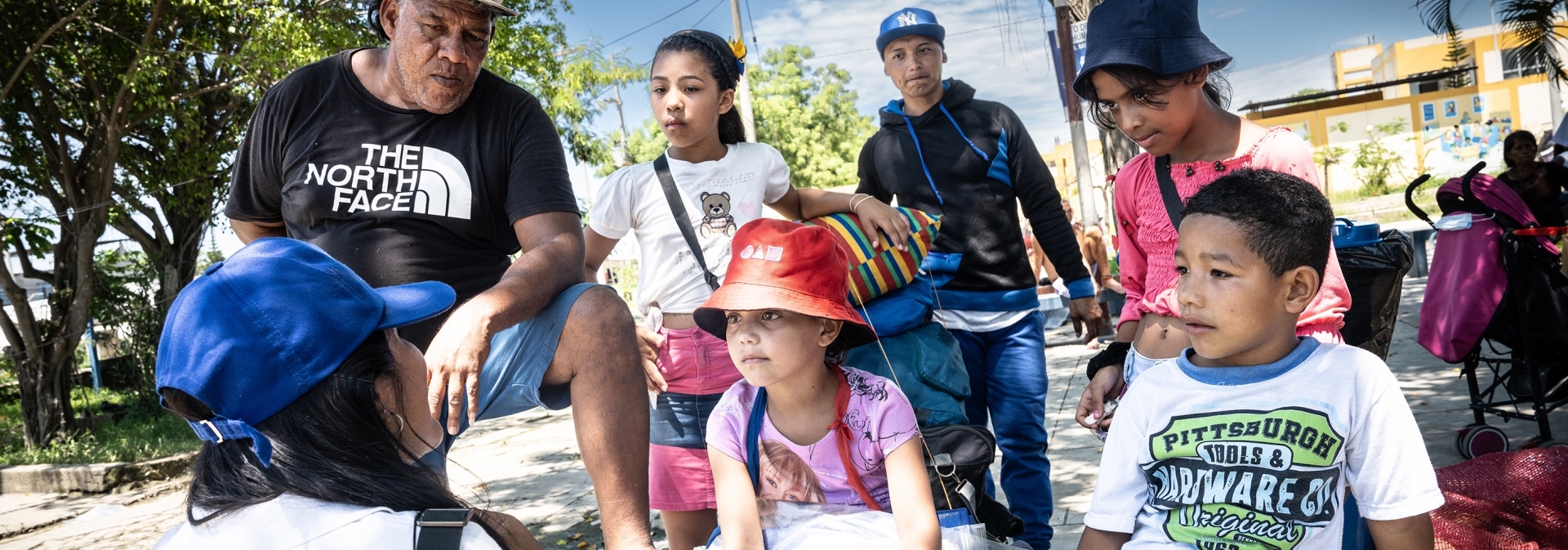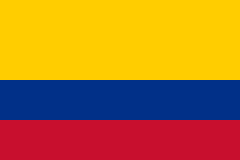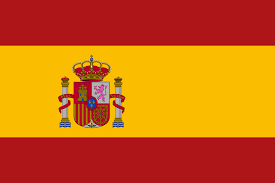IOM Vision
Latin American and the Caribbean (LAC), host to 6.53 million of the 7.72 million Venezuelan migrants and refugees living outside Venezuela, continues experiencing the most significant migration and displacement situation in the region´s modern history. IOM in partnership with the United Nations, non-governmental organizations, civil society organizations and the private sector, support immediate humanitarian and protection needs in transit and destination countries, while addressing longer-term socioeconomic integration and inclusion of migrants, refugees and affected host communities. The Regional Refugee and Migrant Response Plan 2024 Update includes refugees and migrants from Venezuela and all nationalities in-transit, host communities, pendular populations, and Colombian returnees across the 17 countries.
Objective
Saving lives and protecting people on the move
IOM staff will provide WASH services, MHPSS, educational and shelter assistance to migrants, refugees, migrant in transit, returnees, host communities, vulnerable groups, such as children, pregnant women, female-single-headed households, older persons, persons with disabilities, indigenous communities, victims of trafficking, gender-based violence (GBV) survivors, people with diverse sexual orientation, gender identity, gender expression and sex characteristics (SOGIESC).
Relevant government counterparts will participate in the response, such as local governments as frontline responders and government officials in charge of such protection, in addition to shelter managers, border management officials, and national governments.
Systematically capturing, processing, and disseminating information will provide a better understanding of the movements and evolving risk factors and needs of the Venezuelan population- including those in transit, those wishing to remain in their host countries, and those wishing to return to Venezuela.
Through knowledge management products aimed to strengthen the response for Venezuelan migrants and refugee will provide host communities (including journalists, the private sector, students, teachers, and communicators), partners and other stakeholders (including health service providers), educational institutions to analyze and prevent school dropouts, and governments to strengthen information collection capacity and analysis for informed decision-making.
IOM will continue to support migrants, refugees and returnees in destination and in transit, with the provision of basic needs assistance, including :
-
Provision of multipurpose cash assistance (MPCA), food vouchers, and pre-paid cards;
-
Distribution of food kits/baskets, hot meals, school lunchboxes, and ingredients for meal preparation;
-
Ensuring access to nutrition services/interventions by qualified and trained personnel;
-
Provision of equipment to facilitate access to basic needs in collective and temporary shelters, particularly in communal kitchens or other communal spaces;
-
Advocating for stronger prioritization of nutrition interventions as life-saving interventions for migrants and refugees from Venezuela.
To enable access to direct health support for migrants and refugees, IOM will ensure:
-
Promotion and support for access to essential healthcare services and supplies during transit and in-destination, including assistance in sexual and reproductive health (SRH) services, continuity of care for HIV/AIDS, tuberculosis, and non-communicable diseases, family planning, and provision of medicines.
-
Provision of technical support including capacity building, equipment, supplies and advocacy to national authorities to eliminate the main barriers to access (geographic, financial, migrant status) and use of healthcare services (capacity and resources of facilities) while advocating for non-discriminatory access to healthcare services regardless of migration status.
-
Collaboration with with migrant and host communities and organizations to support community-based health interventions and better understand the needs and challenges faced by migrants and develop appropriate solutions.
IOM provides multi-layered community-based mental health and psychosocial support (MHPSS) services to reduce psychosocial vulnerabilities and promote resilience through:
-
Provision of direct MHPSS to vulnerable migrants with mental health problems, including survivors of GBV and their children, such as after-school activities and child friendly spaces for children/youth, individual and group counselling for adults and the elderly, implemented by IOM’s psychosocial mobile teams (PMTs) and implementing partners;
-
Provision of mental health kits comprised of booklets on mental health and self-care, and stress releasing tools to facilitate ongoing support to migrants in transit and in order to promote their psychosocial well-being;
-
Information campaigns on MHPSS and mental health care services;
-
Community and family-level supports such as socio-relational activities, cultural, creative and art-based activities complemented by non-formal learning and small-scale income-generating activities;
-
Provision of focused MHPSS services such as counselling as well as referral to specialized mental health care services;
-
Workshops on mental health promotion and preventative mental health services at the Assistance and Orientation Points (PAO), health centres and other meeting places for refugees and migrants;
IOM will provide movement assistance through:
-
Provision of voucher assistance through the purchase of transportation tickets (as vouchers), including providing safe internal and daily local transportation across host countries to the main cities where migrants and refugees from Venezuela can access basic services, goods and support integration efforts;
-
Transportation provided to reach temporary collective shelters and border areas, as well as to support migrants’ and refugees’ integration process, including movement assistance towards migration offices to facilitate regularization processes or for finding employment;
-
Assistance to national relocation programmes such as Operation Welcome led by the Government of Brazil, including logistical support, such as purchase of flight tickets and medical examination tests, as well as strengthening capacities of and providing technical assistance to key actors in the development of guidelines, recommendations, and tools on movement assistance;
-
Provision of relevant information about risks, rights, and assistance available to migrants and refugees in host countries, as a mitigation and protection mechanism.
IOM will increase migrants’ and refugees’ access to protection services through:
-
Capacity-building of local service providers involved in the mitigation and response to GBV (including health, Psychosocial Support (PSS) , legal and safety services) and human trafficking, including public authorities and educational staff trained in prevention, as well as capacity-building in the investigation and prosecution of trafficking in persons (TiP) cases;
-
Facilitating access to specialized services for GBV survivors and assisting victims of trafficking/persons at risk of through General Case Management with direct provision of assistance and referrals to other services (MHPSS, health, safe shelter, livelihoods and integration);
-
Sensitization activities on integration, rights and protection for children and adolescents, intercultural care systems for practitioners, GBV and Trafficking prevention for victims, those at risk, public and private officials, NGOs, civil society organizations and other organizations, mental health de-stigmatization;
-
Supporting governments in designing, implementing and improving the national regularization programs for Venezuelan nationals, through technical assistance, enhancing the capacity of public officials in legal services, providing necessary equipment, and promoting regional cooperation;
-
Promotion of access to legal services through consultation services, offer guidance on visa applications, extend registration support, and provide financial assistance for visa processing fees;
-
Establishment and equipping of support spaces aiming to improve access to protection services as well as providing technical support to local authorities, strengthening policies, and developing strategies to safeguard migrants and refugees at risk, with a specific focus on children.
-
Training of specialized GBV responders on supporting GBV survivors, remotely and in person, based on the regional, focused PSS support package developed to address the needs of refugee/migrant women
IOM will facilitate access to safe water, sanitation, and hygiene services, especially at the various points of confluence for migrants and refugees whether in-transit or in destination, as well as distribute hygiene items to migrants and refugees from Venezuela as well as affected host communities through the:
-
Direct distribution of items and vouchers for purchasing of items;
-
Implementation of hygiene promotion campaigns and behavioral change strategies;
-
Set-up and rehabilitation of basic WASH facilities’ infrastructure.
IOM will assist the most vulnerable migrants and refugees with:
-
Access to essential non-food items (NFIs) (cooking kits, clothes, household items, and essential household items), tailored to migrants’ needs, through the direct distribution of kits, or cash-based interventions (CBI);
-
Improved conditions of temporary, collective, and transit centres, through enhanced infrastructure and provision of necessary equipment;
-
Provision of rental support through CBI or in-kind modalities.
IOM will facilitate camp coordination and camp management through:
-
Capacity-building and trainings for managers, staff and stakeholders in collective centres, temporary shelters, and reception centres, as well as for civil society, partners and national and local authorities;
-
Trainings on the temporary shelter management toolkit, as well as development of CCCM, AAP, CwC, PSEA and GBV guidelines, recommendations, and tools to provide technical and operational support to key actors to achieve durable solutions and seek exit strategies;
-
Conducting regional surveys and studies on the shelter situation of migrants and refugees from Venezuela.
Through ongoing coordination with R4V partners, regional stakeholders and donors, IOM will ensure:
-
Resource mobilization through donor meetings and visits, liaising, conferences, and presentations;
-
Carrying-out of R4V/the Interagency Group for Mixed Migration (GIFMM in its Spanish acronym) functions including regional and national coordination mechanisms and activities, visibility, information management (IM), capacity-building and general coordination;
-
Monitoring and reporting including situation monitoring, project evaluations, 5Ws reporting, needs assessments, IM platforms, post-distribution monitoring, reporting on the response, and donor and other reporting activities/expenses;
-
Mentoring of partners to:
- Conduct SEA risk assessments: Utilizing the R4V PSEA methodology, conduct joint SEA risk assessments to form a comprehensive picture of SEA risks and response capacities in different operational sites, to inform the implementation/adjustment of response activities and PSEA programmes.
- Ensure that all R4V partner organizations have documented policy, strategies, and guidance in place to prevent SEA: Train PSEA focal points; support national/sub-regional PSEA fora with capacity-building, including coaching and mentoring of partner organizations on key issues (e.g. PSEA policies, codes of conduct, recruitment policies, internal reporting mechanisms and investigations) and best practice seminars
- Provide PSEA information to affected communities: Disseminate collective PSEA awareness-raising messages, previously co-developed with affected communities
-
Maintenance of the regional emergency NFI contingency stock and pipeline;
-
Funding for regional procurement, warehousing, dispatching, in-kind distribution;
-
Support, including financial and technical, to NGO implementing partners in response to sudden large-scale movements of migrants and refugees from Venezuela.
IOM will continue to facilitate Displacement Tracking by:
-
Implementing and strengthening its DTM surveys tools to capture, process and disseminate information through its outputs (reports, maps and dashboards, etc.) on the movements and evolving needs of the Venezuelan population, including profiling of persons intending to return to the Bolivarian Republic of Venezuela.
-
Use of DTM for the review and improvement of coordination mechanisms and joint needs assessments.
Objective
Driving solutions to displacement
Objective 2 interventions focus on assisting migrants and refugees, returnees, vulnerable individuals, including victims of trafficking and GBV survivors, and host communities, indigenous communities, as well as local and national entities, including health providers.
Relevant government counterparts participating in the response and implementing integration activities at the local and national levels, include responders to GBV and educational institutions (teachers, headmasters and other school staff) for general sensitization to integration, GBV prevention and xenophobia.
IOM will promote and support migrants’ and refugees’ educational, financial and economic integration through:
- Facilitating documentation and legal procedures as well as the provision of life-saving information initiatives, including campaigns, orientation sessions, events and printed materials on the regularization process, access to rights, migration policy and the employment of staff, and provision of materials to facilitate legal processes;
- Improving educational facilities and accessibility through the promotion of the educational (diploma validation, enrolment), financial (access to the banking system, seed capital) and economic (entrepreneurship, vocational trainings) inclusion of Venezuelan migrants and refugees through coordination and advocacy with government stakeholders;
- Strengthening the capacities of national authorities and local actors through trainings, and provision of material support (refurbishment, equipment for schools, etc.) to facilitate migrants’ integration;
IOM will support the strengthening of national health systems by:
-
Improving and rehabilitating healthcare facilities;
-
Distributing medicines, and equipment and deploying staff to national health care facilities;
-
Facilitating capacity-building to strengthen comprehensive medical treatment of migrants and refugees;
-
Providing technical support to national authorities to eliminate the primary barriers to accessing and using of healthcare services;
-
Advocating for the inclusion of Venezuelan migrants and refugees in national frameworks that guarantee access to SRH, specialist services and public health interventions in response to health emergencies.
IOM will ensure that vulnerable migrants and refugees, in particular children and adolescents, persons with mental health conditions, survivors of GBV, victims of human trafficking, and smuggled migrants and those in-transit among others have improved access to mental health and psychosocial support in communities and national regional hospitals, through:
-
Organizing communication campaigns that promote and sensitize migrants on mental health needs and services as well as on existing referral pathways and how to access specialized mental health care;
-
Providing direct MHPSS services including individual and group counselling;
-
Training health workers on psychological first aid (PFA), basic psychosocial support and communication skills.
In addition, to facilitate system strengthening for mental health and psychosocial support, IOM will provide:
- Advocacy for the inclusion of Venezuelan migrants and refugees in national frameworks that guarantee access to MHPSS.
- Training of health workers on psychological first aid (PFA), basic psychosocial support and communication skills.
IOM will ensure that:
-
Migrants and refugees are informed of existing water and sanitation facilities;
-
Public learning and healthcare facilities, as well as transit centres and community infrastructures, are equipped with adequate and functioning water and sanitation structures.
In addition, IOM will strengthen WASH capacities through the:
- Rehabilitation and/or construction of water and sanitation facilities and infrastructure, including provision of tools and equipment;
- Promotion of sanitation and hygiene, and waste management among migrants, refugees and host communities participating in community spaces (kitchens, shelters, etc.);
- Provision of technical assistance to authorities and communities to ensure that migrants, refugees and returnees, alongside affected host communities, are included in public programmes, policies, and budgets on access to and management of WASH services.
To facilitate access to livelihoods and economic recovery for migrants and refugees, IOM will provide:
-
Sensitization and capacity-strengthening of relevant government authorities, the private sector, financial institutions and civil society entities in migrant and refugee labour rights, job placement, financial inclusion, recruitment to the formal labour market, emerging technologies, and market gaps;
-
Support to migrants’ and refugees’ entrepreneurship endeavours through seed capital, in-kind grants for small businesses, mentorship, business formalization, marketing, and capacity development for entrepreneurs, job fairs, vendor markets and conferences;
-
Training and awareness workshops on labour rights and economic integration for migrants as well as vocational and professional trainings for migrants and refugees to increase their access to employment opportunities;
-
Engagement with the private sector to promote economic reactivation, corporate social responsibility and ethical labour standards as well as training of private sector actors for the employment and better integration of migrants;
-
Engaging with the private sector by expanding the Enterprise Development Fund (EDF) to support livelihoods at the community level through private sector development.
Argentina, Aruba, Brazil, Bolivia (Plurinational State of), Chile, Colombia, Costa Rica, Curaçao, Dominican Republic, Ecuador, Guyana, Mexico, Panama, Paraguay, Peru, Uruguay, Trinidad and Tobago
The map used here is for illustration purposes only. Names and boundaries do not imply official endorsement or acceptance by IOM.
Figures are as of 31 December 2023. For more details of IOM's operational capacity in country, please see the IOM Capacity section.























